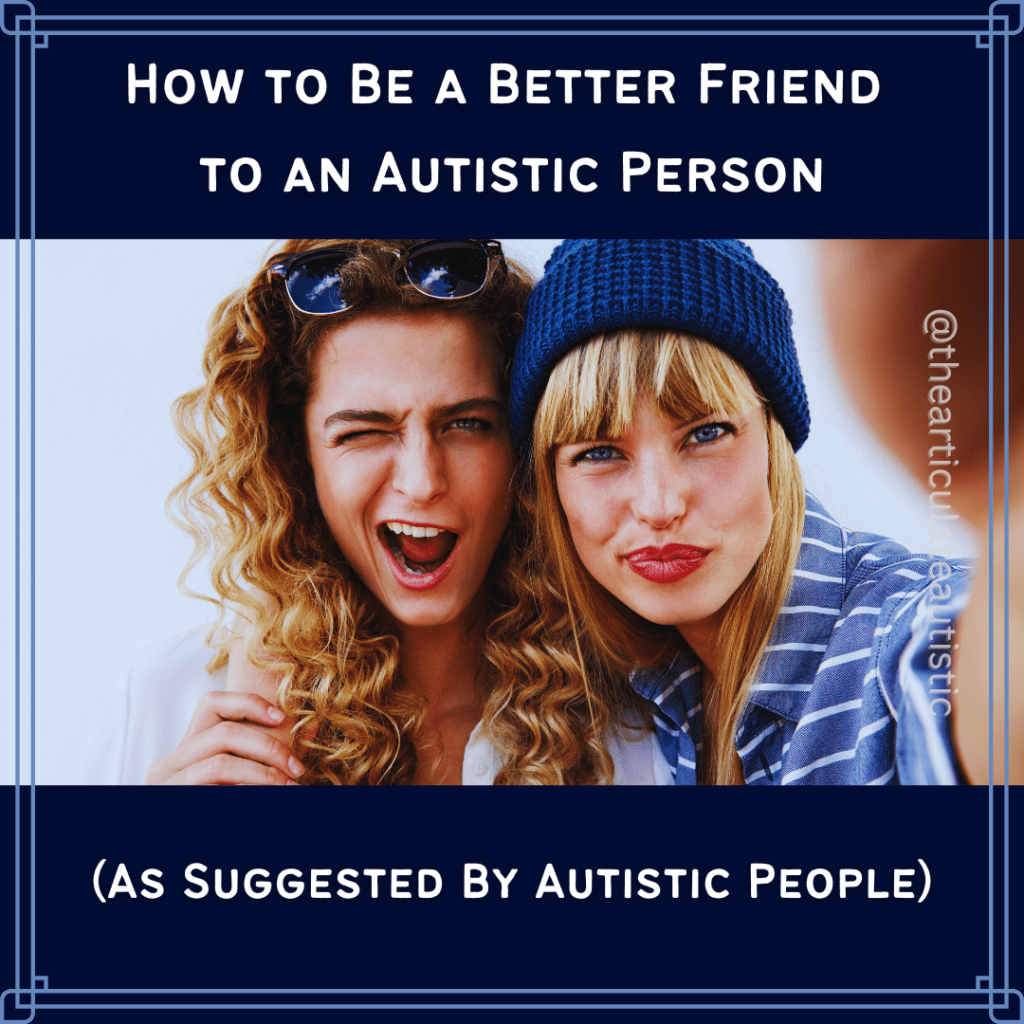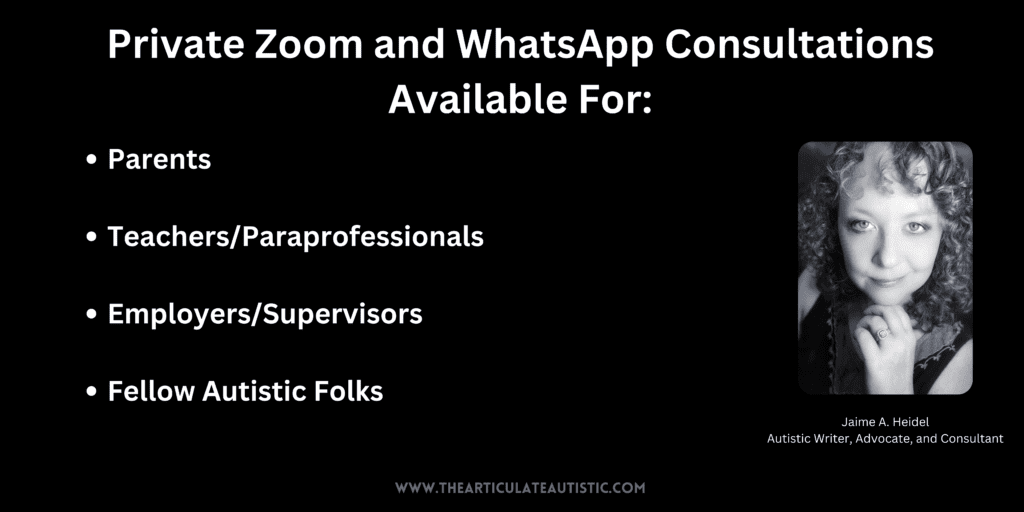How to Be a Better Friend to an Autistic Person (As Suggested by Autistic People)

How to Be a Better Friend to an Autistic Person (As Suggested by Autistic People)
I often ask discussion questions on my Instagram page to get feedback from the autistic community about their experiences, needs, and communication styles.
In this post, I asked my community how neurotypical and allistic people can be better friends to them.
Here’s the advice they offered:
1. Research what it means to be autistic.

There’s still a lot of misinformation and stereotyping out there when it comes to what it means to be autistic. If you have an autistic person in your life, and you want to understand them better, consume content created by autistic adults that explains the autistic experience from our point of view.
Here are some books, social media accounts, and podcasts to get you started:
- Books
“What Did I Do Wrong?” – Jaime A. Heidel
Divergent Mind – Jenara Nerenberg
Unmasking Autism – Devon Price, PhD
https://www.instagram.com/thespectrumgirl
https://www.instagram.com/neurodialectical
- TikTok
- Podcasts
The Neurodiversity Podcast with Emily Kircher-Morris
2. Believe our experiences exactly as we explain them.

Another important way to be a better friend to an autistic person is to believe our experiences exactly as we explain them. We aren’t exaggerating when we say it’s too loud, hot, bright, etc., and we aren’t trying to “get out of something” by stating our genuine needs.
Our sensory and nervous systems operate differently from yours, and, even if it seems extreme to you, we’re reacting to our environment on a level equal to what we feel. Believe us.
3. Say what you mean, and mean what you say.

Some autistic people are comfortable with sarcasm, idioms, and double entendres, some are not. And, for some, it depends on the situation or person we’re interacting with. If you’re just getting to know an autistic person, use plain and literal language to get your point across until you learn their individual communication preferences.
4. Avoid assuming our intentions.

If you’re new to interacting with autistic people, you’ll naturally default to ascribing neurotypical intentions to autistic communication. Unfortunately, this means you’ll also misread our tone of voice, facial expressions, or body language and assume hidden meanings, which can create conflict that appears to come out of nowhere for the autistic person.
The best thing you can do for the sake of your friendship is to ask for clarification instead of having sudden emotional reactions that will make your autistic friend feel confused and unsafe.
5. Clearly explain what upset or offended you.

Speaking of body language and facial expressions, your autistic friend may not be able to read yours. This could make you feel as though you’re being purposefully ignored or neglected when, in truth, your friend’s brain is not designed to read subtle non-verbal communication. If you’re upset or offended, or if you have an unmet need, express this in clear, literal language.
6. Ask questions and allow questions.

If you’re unsure about the motivation behind a word or deed, ask your friend directly.
“This is what happened. This is usually what allistic people mean when they say/do this. Is that what you meant?”
Furthermore, many autistic people are bottom-up thinkers who need lots of details to form a complete picture of what’s being said to them. Therefore, they may ask a lot of clarifying questions. They’re not trying to turn the focus of the conversation to themselves or interrupt your flow; they’re doing this to understand and connect with you!
7. Give advanced notice.

Another helpful way to make your autistic friend feel safe and respected is to give them advanced notice if plans change, if someone else will be joining in on an outing, or if you will need something from them soon (a dozen cookies for a birthday party, a ride to a doctor’s appointment) instead of springing the information or request on them at the last minute.
The autistic nervous system relies on routines to stay regulated, and interruptions in those routines can lead to distress and meltdowns (compounded by feelings of guilt and shame in the aftermath). While some autistic people are fine with being spontaneous, most of us do best when we know the plans well ahead of time (and any changes that will occur within).
8. Listen and respond to our words, not tone or facial expressions.

As a neurotypical person, you’re used to looking for changes in vocal tone and facial expressions to understand what’s “really” being said in a conversation. If you try to do that with us, however, you’ll only be confused and frustrated.
Due to our neurological differences, our non-verbal communication won’t always match our words. This is why it’s critical to take our words at face value and respond to them instead of trying to “read between the lines” by watching what our faces or bodies are doing as we speak.
9. Avoid making promises or plans just to “be polite”.

“Let’s go get coffee and catch up sometime!” “If you’re struggling with money, I can lend you some.” “If you ever need anything, don’t hesitate to call.” “Well, my boyfriend and I were just headed to a movie, but you can come along if you want.”
Offering help, support, or a hangout isn’t something an autistic person would do as a perfunctory social nicety. If we say something like this, we genuinely mean it. This is why it’s both baffling and mortifying when we take these phrases literally and find out (only when it’s far too late) that we unintentionally made a grand social mistake.
Avoid social niceties when it comes to interacting with your autistic friend. Just be honest!
10. Don’t ghost.

And last, but not least, don’t just up and vanish on your autistic friend. If they said or did something you found offensive, tell them in plain language what happened and how you took it, and then give them the chance to explain things from their perspective.
If, for some reason, you feel you can’t pursue the friendship anymore, that’s fair enough. Some people just don’t click, and there’s nothing wrong with that. But tell them why instead of simply disappearing. Too uncomfortable for a face-to-face conversation? Send an email.
The Takeaway
So many of us autistic folks have had it drilled into our heads since childhood how important it is to make friends and have connections, but because autistic and allistic people approach communication in such different and sometimes opposing ways, it can make having a successful inter-neurotype friendship a challenge.
If you truly care about the autistic person in your life, you must be willing to at least meet them halfway by learning their neurological language and answering their questions so they have the opportunity to learn yours.
Need more personalized help with a particularly sticky issue between you and your autistic friend? Or are you the autistic person, and you are currently in conflict with your neurotypical friend? I offer consultations for friends, family, partners, and co-workers of autistic people. Click on the link here or on the picture below to learn more and book an appointment.



